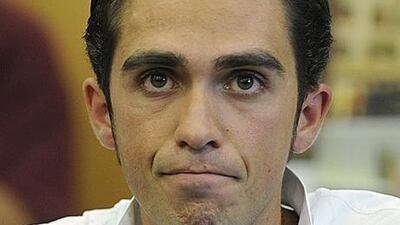Steak, an entity known to do nothing more than sit obediently upon a plate and wait for the cutlery, suddenly has joined a vivid line of culprits.
It cannot even defend itself because it is, by definition, dead. Yet now that Alberto Contador, the Tour de France champion, has blamed an uncommonly juicy steak for his positive doping test during the Tour he just won in July, steak finds itself in the busy fray vying for prominence among athletes' doping excuses in a doping era.
Steak does have a close precedent in its more controversial cousin, veal. Petr Korda, the 1998 Australian Open tennis champion, blamed a positive test on his fondness for veal, as if veal did not have enough problems.
Then some studious people noted that Korda would have had to consume herds upon herds of veal for decades upon decades to match the level he had attained. Veal, it would seem, outflanks steak for absurdity.
Poor old steak also takes a trumping next to spaghetti bolognese, the miscreant flagged - successfully - by the English bobsledder Lenny Paul.
When you picture Paul's plate, you are picturing pretty much a smidgen of spaghetti and a stunning heap of bolognese. That picture alone means the dreaded bolognese clearly outpaces both steak and veal.
The Bolognese With A Hint Of Spaghetti, in fact, runs roughshod among the foodstuffs athletes have pegged as perps. For ludicrousness it clearly defeats the sarsaparilla-and-ginseng energy drink accused by Ben Johnson, the deltoid-rich Canadian sprinter from Seoul in 1988.
It routs poor, helpless flaxseed oil, the wrongdoer that came up in the courtroom in the case of Barry Bonds, the American baseball slugger. It steams over the allegedly tainted vitamin B-12 injection of Rafael Palmeiro, the American baseball impostor.
Yet it yields at last in the mighty presence of the whisky cited as a testosterone-booster by the disgraced American cyclist Floyd Landis, who went to the loonily cynical extent of autographing a bottle of the spirit and auctioning it off at a subsequent Tour of California.
Whisky wins in the accused-foods category which continues to conduct a popularity contest against the wayward-relative category.
In explaining how he secured his drugs, Alex Rodriguez, the American baseball supernova, went with the unnamed-cousin storyline, no doubt hoping to gain empathy as most of us do have unnamed cousins.
Gilberto Simoni, the Italian cyclist, according to multiple sources, succeeded in arguing the furtive horror of lozenges his aunt brought back from Peru. Everyone loves a subversive-aunt and Peruvian-lozenge stories, making this doubly impressive.
Wives have turned up with varying degrees of innocence as in the case of Roger Clemens, the American baseball pitcher, (trainer supplied human growth hormone to wife but, somehow, not husband).
Shane Warne, the great Australian cricketer, according to the Daily Telegraph and other newspapers, in 2003 noted a well-meaning mum who provided pills to reduce facial puffiness. Still, no relative or best friend approaches the loopy majesty of whisky, so long regarded as a performance dis-enhancer before its heyday with Landis.
Whisky streams unmitigatedly into all-around medal contention, and only there does it ebb.
It finds furious contention from the genre of discotheque-blaming, which includes tennis player Richard Gasquet, who argued - successfully - that his positive test for an illegal recreational drug sprang from kissing a nightclub waitress, and cycling's Jan Ullrich, who indicted two pills he ingested in a nightclub, as we all know the wisdom of finely tuned athletes ingesting pills in a disco.
Whisky eventual fails when up against the genre of massage-therapist-blaming as in the cases of Justin Gatlin, the American sprinter, and the Lance Armstrong, the seven-time Tour de France champion. Here massage therapists are supposed to make life more palatable, and either through intent (Gatlin) or indifference (Armstrong) they're out there committing sabotage.
It's enough to make you lose hope, but it's not enough to get the bronze medal. That goes to Romario, the Brazilian Lothario and football impresario. He had reached age 41 in 2007, enabling him to seize a stirring chance to blame a positive test upon his hair-loss medication. Surely many wept out of familiarity, but it's unfamiliarity that snared the silver.
That's because until Dieter Baumann, the German runner, the world with all its troubles still had not awakened to the singular horror of toothpaste-spiking such as engulfed poor Baumann.
And still more edifyingly, surely most of humanity had not pondered even the possibility of what befell Tyler Hamilton, the American cyclist.
Hamilton's brave acknowledgement of the possibility of a "vanishing twin" from his days in the womb explained to all doubters how alien blood could have found its way into Hamilton's vessels. It proved so exotic that it proved golden, no easy feat in one preposterous era.
cculpepper@thenational.ae

